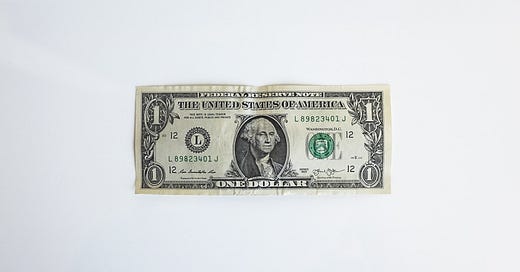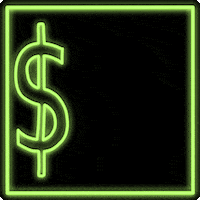We’re not very good at talking candidly about money, and I’m no exception.
We’re constantly thinking about it — Who paid for that car? How much money came with that promotion? — but we’re not very specific about what we’re making, spending, or how we really cobbled together that down payment.
For the past three and half months, I’ve been getting used to a new numbers game. I’ve been collecting unemployment each week, $703.50 with the pandemic bonus and taxes withheld. It’s a little more than half my pre-layoff pay, and it’s not lost on me that I’m more comfortable talking about it at a time when my income is a fixed, public figure.1
The thing about it, though, is that I don’t find myself thinking about the “missing” money (I mean, sure, I do, but bear with me here). I more often find myself marveling at the fact that I’m able to make ends meet in a city like New York. My rent gets paid, I’m still able to eat out here and there, and I’m not particularly stressed about meeting my financial obligations despite the fact that I couldn’t be accused of rigorously budgeting. The real shock of the whole ordeal (and I know marginalized groups like undocumented immigrants aren’t so lucky) is that the assistance is actually meeting the moment.
Sure, I’ve kept a lingering thought in my mind that any big ticket items should wait until I’m on surer footing, and this mindset has also surely cut down on smaller impulse buys. And, no, I’m not saving any money, but I’m not really losing any either, and the benefits of a pause from forty-hour workweeks are allowing me to see my actual needs more clearly than I have in a long time.
There’s freedom in starting over, but it’s not without the unnerving feeling that you put in a lot of time in one direction that could have been better spent if only you’d known the unknowable. During a recent such spiral, an insightful friend suggested I write down some future possibilities on post-it notes and stick them up around my bedroom with the idea that my eyes would land on one from time to time and I could picture myself down that road for a few minutes.
When I had about ten notes stuck on my walls, I realized that very few of them had so-called practical or high-earning ideas. They were more along the lines of bookstore, nonprofit, librarian, writer, etc. I’m not surprised that these are the places my heart wandered, but without the luxury of regular income at this time, I don’t think any of those would be on the list let alone be the actual kinds of jobs I’m applying for.
Somehow, during a period of time where I thought I’d be most stressed about money, I’ve received the gift of time and space to think while still covering my expenses. Unemployment has been a lifeline for someone who already had a pretty comfy perch — white, male, healthy, educated…the lottery-like status markers go on — and I hope it’s offered similar respite for folks who needed the break more than I did.
Folks busting their asses in bars or bookstores or other retail spots. Folks who didn’t have the luxury of looking farther ahead than their next shift for fear that if they stopped treading water long enough to see the next wave, they’d drown. I hope they, and the people pulling the pursestrings, are able to see what they could dream and create with a little more support.
Those who claim that safety nets like unemployment discourage people from showing up to work at all are kind of right. What they don’t realize, though, is that it’s not the money that’s the motivation. It’s the break. It’s the stress relief. It’s the opportunity to stop and think about what you might really do if your basic needs were human rights. It’s the future that liberals want, and it’s something that a country making $23bn in arms sales can and should continue to provide in more ways than this.
If it doesn’t, we’ll continue to lose out on a whole host of poets, philosophers, painters, and people who just need a breather. Is that the future you want?
Here’s a quick Money Diary™️ for an average month on unemployment…
Monthly Income: $2814
I’ve been collecting the weekly maximum of $504 plus the extra $300 in pandemic assistance (Weekly, with taxes withheld, it’s $703.50). For some more fancy math, this would be like working 40 hours a week at $20/hour or a salary of $41,600.
Without the $300 bonus checks, the $504/week would add up to $26,208 in a year.
Monthly Spending: $2895 (average of February and March)
I’ve come out a little in the red each of the past two months, but neither overage was more than $100. The major expenses were:
Rent (w/ two roommates): $1200.
Groceries, other meals, alcohol: ~$900
Shopping: ~$250
Bills: ~$100




